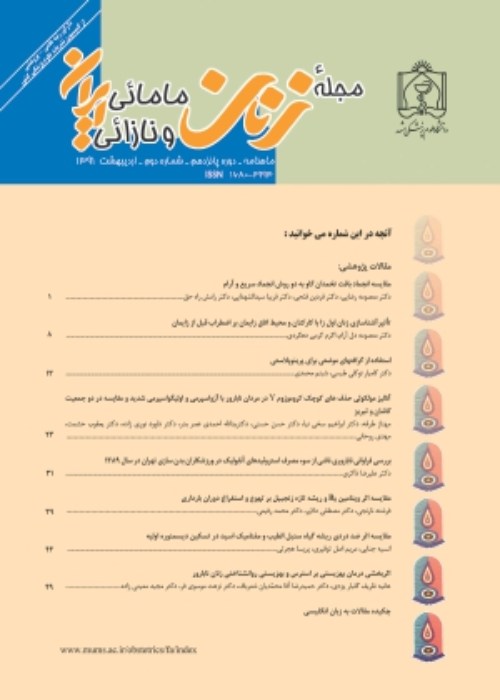Relationship between levels of androgen hormones, hirsutism and acne with depression and anxiety in women with polycystic ovary syndrome
Article Type:
Research/Original Article (دارای رتبه معتبر)
Abstract:
Introduction
The quality of life in patients with polycystic ovary syndrome is affected by wide variables. Various studies have shown that these patients are at high risk of depression and anxiety. The most important symptoms of polycystic ovary syndrome include hirsutism, acne, and increased androgen hormones. This study was performed with aim to evaluate the relationship between levels of androgen hormones, hirsutism, and acne with depression and anxiety in women with polycystic ovary syndrome.
Methods
This case-control study was performed on 53 patients with polycystic ovary syndrome selected by Rotterdam criteria, and 50 healthy women as control group in Tehran Arash Hospital in 2015-2016. The tools of data collection were questionnaire of demographic information, Beck Depression and Anxiety questionnaire, Ferriman - Gallwey Score to assess the degree of hirsutism, Global Acne Grading System, clinical features of hyperandrogenism and laboratory tests’ results (Total testosterone, free testosterone, sex hormone binding globulin). Data were analyzed by SPSS software (version 21) and T-test, Chi-square, and Pearson Correlation Coefficient. P<0.05 was considered statistically significant.
Results
Mean scores of acne (p=0.02), hirsutism (p<0.001), total testosterone (p=0.008), and free testosterone (p=0.01) were meaningfully higher in patient group than control group. Mean Sex Hormone Binding Globulin level was not significant different in case and control groups (p=0.3). Mean scores of depression (p=0.001) and anxiety (p=0.01) in patient group (20.35±9.82 and 17.35±10.44) were significantly higher than control group (14.46±8.40 and 12.40±9.65). No significant relationship was found between total scores of acne, hirsutism, total testosterone, free testosterone and sex hormone binding globulin with depression and anxiety (p>0.05).
Conclusion
Significant increase in the scores of anxiety and depression in patient group compared to control group can be indicative of depressed and anxious mood in patients with polycystic ovary syndrome.Keywords:
Language:
Persian
Published:
Iranina Journal of Obstetrics Gynecology and Infertility, Volume:22 Issue: 5, 2019
Pages:
61 to 70
magiran.com/p2013350
دانلود و مطالعه متن این مقاله با یکی از روشهای زیر امکان پذیر است:
اشتراک شخصی
با عضویت و پرداخت آنلاین حق اشتراک یکساله به مبلغ 1,390,000ريال میتوانید 70 عنوان مطلب دانلود کنید!
اشتراک سازمانی
به کتابخانه دانشگاه یا محل کار خود پیشنهاد کنید تا اشتراک سازمانی این پایگاه را برای دسترسی نامحدود همه کاربران به متن مطالب تهیه نمایند!
توجه!
- حق عضویت دریافتی صرف حمایت از نشریات عضو و نگهداری، تکمیل و توسعه مگیران میشود.
- پرداخت حق اشتراک و دانلود مقالات اجازه بازنشر آن در سایر رسانههای چاپی و دیجیتال را به کاربر نمیدهد.
دسترسی سراسری کاربران دانشگاه پیام نور!
اعضای هیئت علمی و دانشجویان دانشگاه پیام نور در سراسر کشور، در صورت ثبت نام با ایمیل دانشگاهی، تا پایان فروردین ماه 1403 به مقالات سایت دسترسی خواهند داشت!
In order to view content subscription is required
Personal subscription
Subscribe magiran.com for 70 € euros via PayPal and download 70 articles during a year.
Organization subscription
Please contact us to subscribe your university or library for unlimited access!


